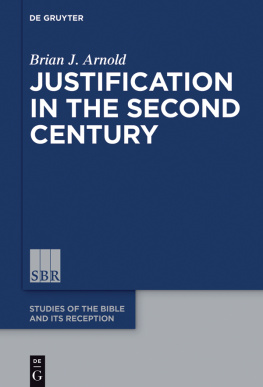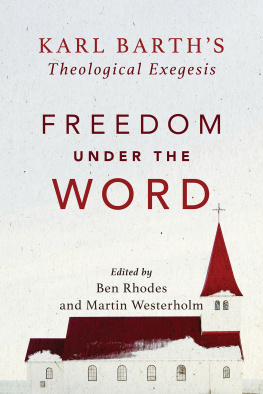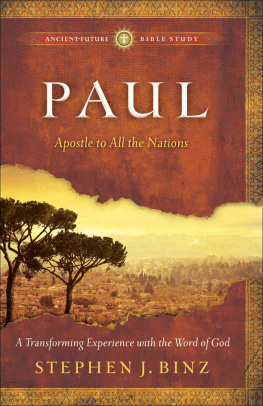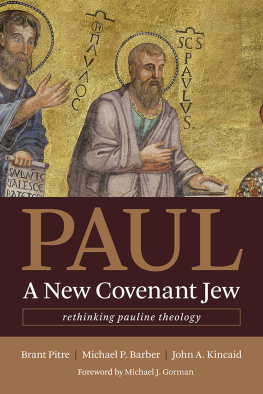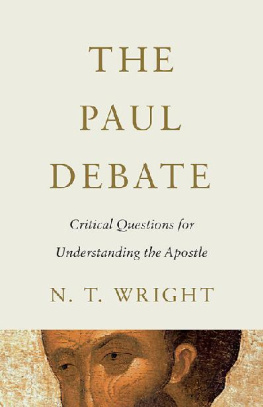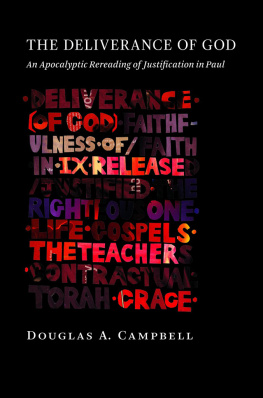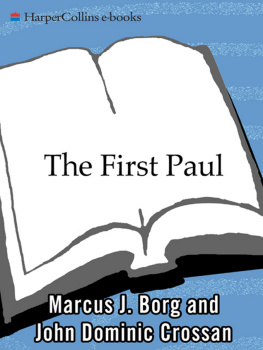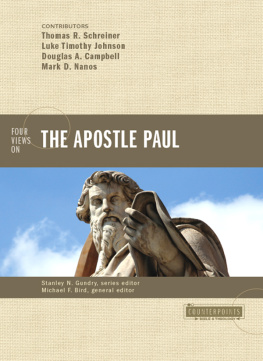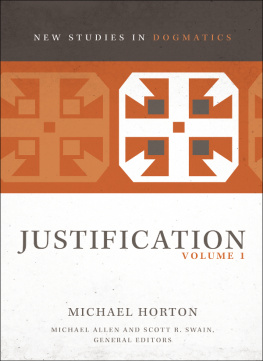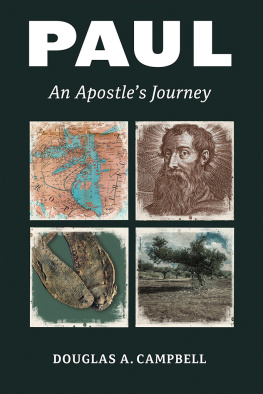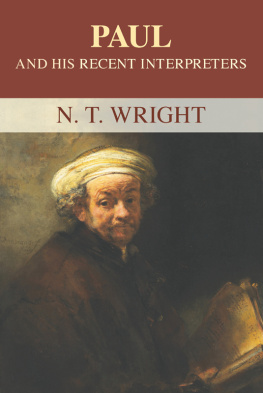Justification Reconsidered
Rethinking a Pauline Theme
Stephen Westerholm
WILLIAM B. EERDMANS PUBLISHING COMPANY
GRAND RAPIDS, MICHIGAN / CAMBRIDGE, U.K.
2013 Stephen Westerholm
All rights reserved
Published 2013 by
Wm. B. Eerdmans Publishing Co.
2140 Oak Industrial Drive N.E., Grand Rapids, Michigan 49505 /
P.O. Box 163, Cambridge CB3 9PU U.K.
Printed in the United States of America
18 17 16 15 14 13 7 6 5 4 3 2 1
Library of Congress Cataloging-in-Publication Data
Westerholm, Stephen, 1949
Justification reconsidered: rethinking a Pauline theme / Stephen Westerholm.
pages cm
Includes bibliographical references and index.
ISBN 978-1-4674-3927-5 (pbk.: alk. paper)
1. Justification (Christian theology)
2. Bible. Epistles of Paul Theology.
I. Title.
BT764.3.W38 2013
234.7 dc23
2013011135
www.eerdmans.com
Contents


T hose of us brought up, not simply on the letters of Paul, but on a distinctive way of reading those letters, do well to engage with those who read Paul differently. We learn most, it seems, from those with whom we differ. They may see what we have missed. They may see correctly what we have misperceived. And even when we are convinced that the misperceptions are theirs, the raising of fresh questions invigorates our reading of familiar texts and increases our appreciation of those whose careful reading of Paul led them to insights that we, till now, have taken for granted.
In this short work, I engage with scholars who have posed fresh questions, and proposed fresh answers, regarding the familiar texts in which Paul speaks of justification. Though many have been convinced by their interpretations, my own reinvigorated reading of Paul has led me, in these particular instances, rather to question the claims of the revisionists; I attempt here to explain why. By now a generation of scholars has arisen for whom the more recent proposals represent the only way of reading Paul to which they have been seriously exposed. I trust they may find, in reading these pages, that older interpreters saw aspects of the texts they have missed, or construed them in ways more faithful to Paul. If, in the end, they retain their loyalty to newer perspectives, perhaps they will grasp better the challenge faced by those who first proposed them.
Let me stress that attention in this study is confined to the theme of justification in Paul and, more specifically, to recent revisionist proposals about how it is (and is not) to be understood. Topics that go undiscussed are not deemed unimportant, or even less important than those here treated; but we confuse rather than clarify what Paul has to say about justification when we try to include, in the meaning of this term, other sides of his thought. Justification is one way in which Paul depicts human salvation; what he has to say is essential to that topic, but still only one of its aspects. And though, inevitably, it is related to other themes in Pauline theology, my concern here is to illumine the distinctive contribution to that theology of his language of justification.
My aim in this book is both to update and to make more widely accessible earlier work I have done; in doing so, I draw freely, with the publishers permission, on earlier studies: Justification by Faith Is the Answer: What Is the Question? (Concordia Theological Quarterly 70 [2006]: 197-217), and especially PerspectivesOld and New on Paul: The Lutheran Paul and His Critics (Grand Rapids: Eerdmans, 2004). is based on a paper given at the annual meeting of the Society of Biblical Literature in Boston (November 2008).
I want to thank Todd Still and Monica Westerholm for their careful reading and helpful comments on an earlier draft of this study. They are not, of course, responsible for the views and opinions expressed in these pages, but they have certainly helped me to present my argument more clearly.
This book is dedicated to my daughter Jessica and her husband. Jessica was brought up on Paul, and brought up with Paul, but anyone who thinks it unremarkable that she should then marry Paul has not heard their story. May the blessing of the One who, in remarkable ways, brought them together rest upon their married lives and service of him.
CHAPTER ONE

S ir Edmund Hillary climbed many mountains besides Everest. Neil Armstrong took many steps that did not land him on the moon. Krister Stendahl wrote a number of articles besides The Apostle Paul and the Introspective Conscience of the West. But no one cares. If Hillary, Armstrong, and Stendahl are remembered today, it is for one brief, shining moment.
The world of Stendahls fame is, to be sure, a good deal more confined than that of Hillary or Armstrong. But among New Testament scholars, his piece on the introspective conscienceout of his first-century context is to distort him. And the ancients, among whom we must include the apostle Paul, were apparently not given to introspection. According to Stendahl, Augustine, not Paul, express[ed] the dilemma of the introspective conscience, and he may well have been one of the first to do so (83). His Confessions is the first great document in the history of the introspective conscience. The Augustinian line leads into the Middle Ages and reaches its climax in the penitential struggle of an Augustinian monk, Martin Luther (85). Self-examination, among those who took this practice seriously, brought on pangs of conscience; pangs of conscience led such people to ask in despair, How am I to find a gracious God? It is in response to their question, How can I find a gracious God? that Pauls words about a justification in Christ by faith, and without the works of the Law, appears as the liberating and saving answer (83).
But their question was not Pauls question. Pauls concern was the place of the Gentiles in the Church and in the plan of God (84). Hence (Stendahl claims) the West for centuries has wrongly surmised that the biblical writers were grappling with problems which no doubt are ours, but which never entered their consciousness (95). Where Paul was concerned about the possibility for Gentiles to be included in the messianic community, his statements are now read as answers to the quest for assurance about mans salvation out of a common human predicament (86). Stendahl later summarized his differences from Ernst Kse-mann, his most noted and sharpest critic, along similar lines: The first issue at hand is whether Paul intended his argument about justification to answer the question: How am I, Paul, to understand the place in the plan of God of my mission to the Gentiles, and how am I to defend the rights of the Gentiles to participation in Gods promises? or, if he intended it to answer the question, which I consider later and western: How am I to find a gracious God? (131).
How we construe Pauls claim that one is justified by faith, And, like a number of axioms dear to New Testament scholars, this one contains a grain of truth. The earliest followers of Jesus were Jews. Paul was called to be an apostle to the Gentiles (Rom 1:1; 11:13). The question how Gentile converts could be united with Jewish believers in a single community of faith brought different responses from different early church leaders. Some thought Gentile believers needed to become Jews through circumcision, and to live as Jews by keeping Jewish food laws, the Sabbath, and the like. To them and their views, Paul led the opposition. Justification became a central theme in his letters first in his response to this debate. So much any careful reader of the New Testament must grant.
Next page

